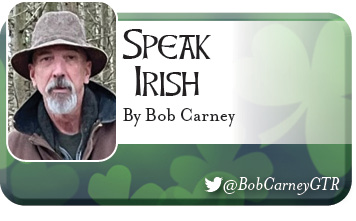
 Speak Irish: Regular Verbs
Speak Irish: Regular Verbs
By Bob Carney
Cén chaoi a bhfuil sibh? Tá súil agam go bhfuil tú go maith. How are y’all? I hope you’re doing well. Irish verbs start off in their root form or command form, which is how you say a verb when giving an order. Unlike English, Irish does not use an infinitive form such as “to do” or “to be”, and you don’t need to use any pronouns. Their is a distinction between singular and plural, so different forms are used when giving commands to one person or more than one person.
Singular Irish Commands Plural Irish Commands
tóg (toeg) take tógaigí (toeg-uh-gee) y’all take
éist (aysht) listen éistigí (aysht-ih-gee) y’all listen
féach (fay-uk) look féachaigi (fay-uk-uh-gee) y’all look
siúil (shoo-ihl) walk siúlaigí (shool-uh-gee) y’all walk
rith (rih) run rithigí (rih-hih-gee) y’all run
labhair (lau-wer) speak labhraígi (lau-wruh-gee) y’all speak
scríobh (shkree-uv) write scríobhaigí (shkree-uv-uh-gee) y’all write
ól (oel) drink ólaigí (oel-uh-gee) y’all drink
ceannaigh (kya-nee) buy ceannaígí (kya-nuh-gee) y’all buy
When giving a command to more than one person, you add the endings “-igí” or “aigí to the end of the root verb, sometimes the root verb will drop its ending or drop a vowel from its ending or sometimes even add a vowel. There are patterns to these changes and will be studied as you continue in your Irish language studies.
We can also make a command negative, like we do in English, “Don’t be bad”. All you needto do is put the word “ná” in front of the command verb, you can use it for singular or plural. It does not cause any changes to the verb unless it starts with a vowel, then h- would precede the verb.
Negative Commands
Ná bí dána (naw bee dahn-ah) Don’t be bold (don’t be bad)
Ná siúil (naw shoo-il) Don’t walk
Ná tógaigí (naw toeg-uh-gee) Don’t take
Ná h-ól (naw hoel) Don’t drink
Ná bí ag caint (naw bee ag kynt) Stop talking
Clarification is very important. When my boys were younger and living at home I had to be very specific. “Oh, you wanted us to shovel the walk today? Sorry, we thought we could do it next week.”
Object Pronouns
É (ay) he or it
Í (ee) she or it
Iad (ee-ud) they
Time Vocabulary
Inniu (inn-yoo) today
Amárach (uh-mah-rahk) tomorrow
Anois (uh-nesh) now
Anois díreach (uh-nesh jee-rahk) right now
Níos déanaí (nees jee-nee) later
Specific Irish Commands
Tóg é anois direach! (toeg ay uh-nesh jee-rahk) Take it right now!
Déan deifir anois (dane def-her uh-nesh) Hurry up now.
Ná h-ol an t-uisce inniu. (naw hoel un tish-ka inn-yoo) Don’t drink the water today.
Ná tóg na boscaí amárach. (naw toeg naw bus-kee uh-mah-rahk) Don’t take those boxes tomorrow.
We can say where we want something done. Location words would come right after the verb r the verb and noun. If you use a pronoun for it or they, the pronoun is pushed to the end of the sentence.
Tar isteach anseo. (tahr ish-tahk un-shuh) Come in here.
Féach faoin mbord. (fay-uk fween mord) Look under the table.
Ná siúil faoi. (naw shoo-il fwee) Don’t walk under it.
Irish Commands for Pets
Suigh (see) sit
Suigh síos (see shees) sit down
Tar (tahr) come
Tar anseo (tahr ahn-sho) come here
Fan (fahn) stay or wait
Fan anseo (fahn ahn-sho) stay here
Stad (stahd) stop
Cuir faoi (kur fwee) settle down
Ciúnas (cue-ness) quiet
Bí ciúin (bee cue-inn) be quiet
PRAISE FOR PETS
Maith thú (mah who) good job
An-mhaith (ahn-wah) very good
Buachaill maith (boo-kel mah) good boy
Cailín maith (kuh-leen mah) good girl
Other Useful Irish Verbs and Phrases
Dún an doras (doon ahn dor-us) close the door
Éirigh (eye-rig) get up or rise
Ná bí dána (nah bee dahn-uh) don’t be bold (bad)
Imigh leat (ih-mig lyat) go away (bugger off)
Fan liom (fahn lum) wait for me
Tabhair cabhair (taw-ur kaw-ur) help him
Tabhair dom an cupán sin (taw-ur dom ahn koo-pun shin) Give me that cup.
Seo dhuit (sho gwit) Here you are.
I hope you will use some of these verbs on a daily basis. By adopting one or two at a time into your daily vocabulary, your familiarity with the languge wiil grow. Remember you can use Irish no matter who you are speaking with, my dogs will back me up on that!
SLÁN GO FÓILL!
*Bob Carney is a student of Irish language and history and teaches the Speak Irish Cleveland class held every Tuesday at PJ McIntyre’s. He is also active in the Irish Wolfhound and Irish dogs organizations in and around Cleveland. Wife Mary, hounds Rían and Aisling and terrier Doolin keep the house jumping. He can be reached at [email protected]

Monthly newsmagazine serving people of Irish descent from Cleveland to Clearwater. We cover the movers, shakers & music makers each and every month.
Since our 2006 inception, iIrish has donated more than $376,000 to local and national charities.
GET UPDATES ON THE SERIOUS & THE SHENANIGANS!